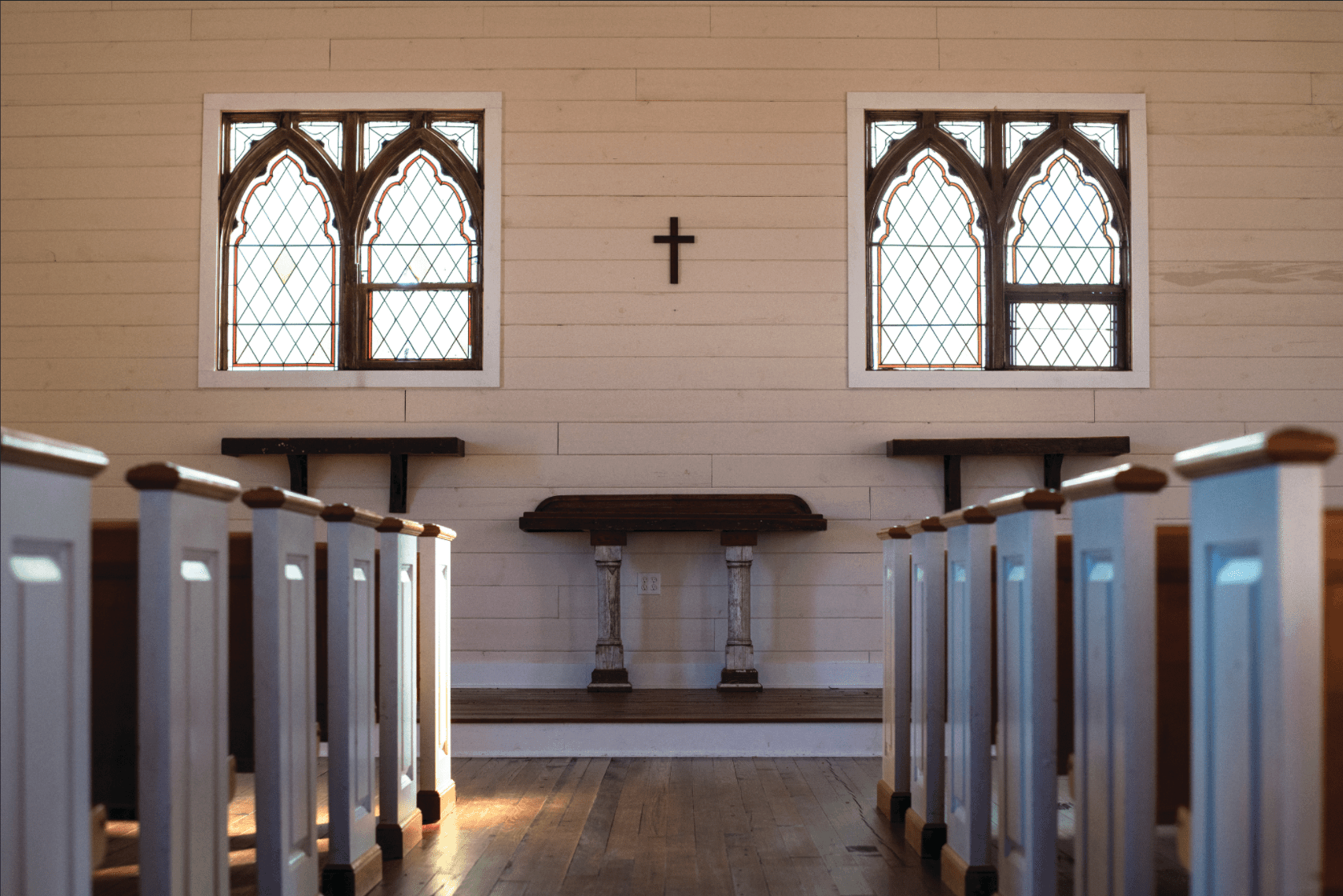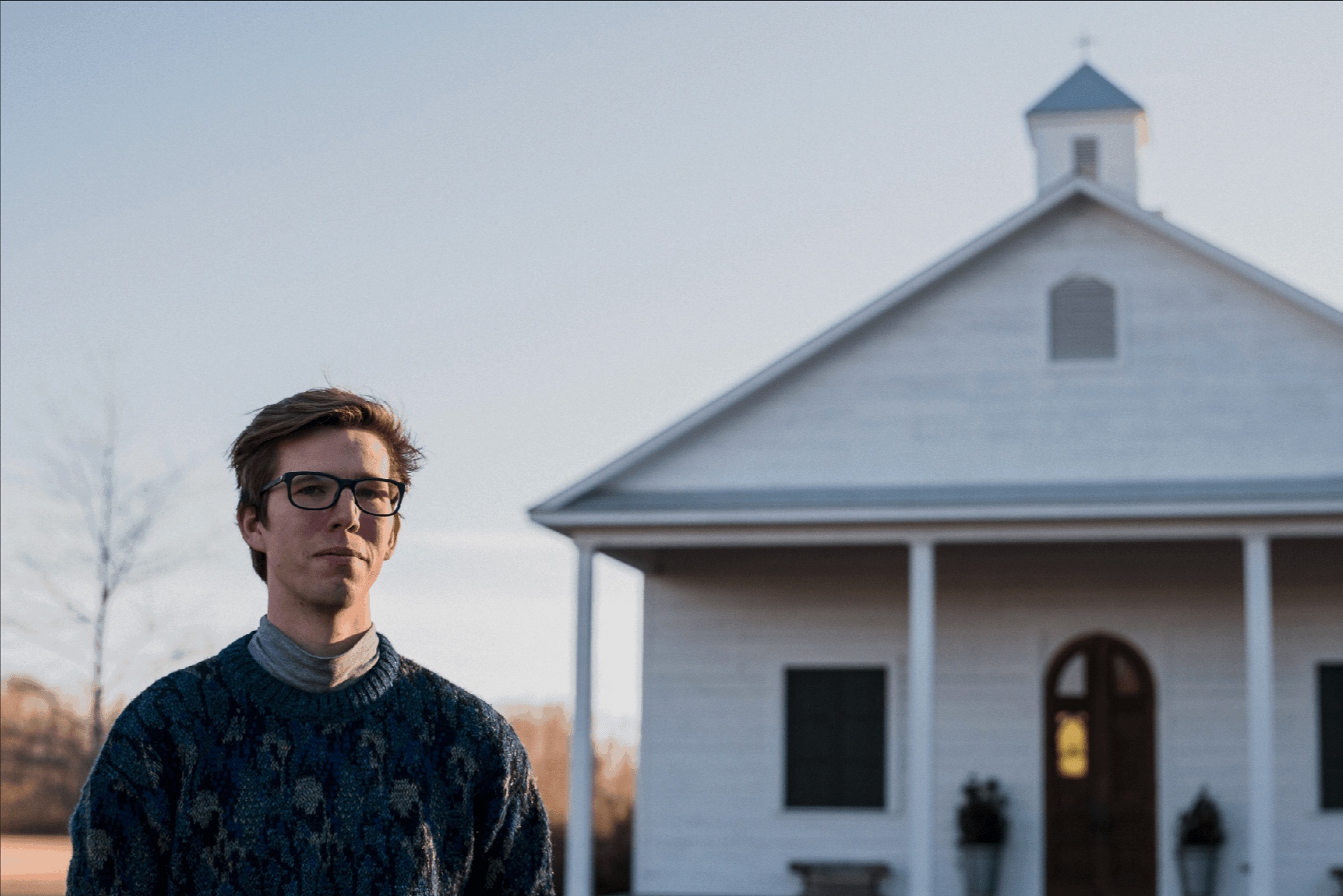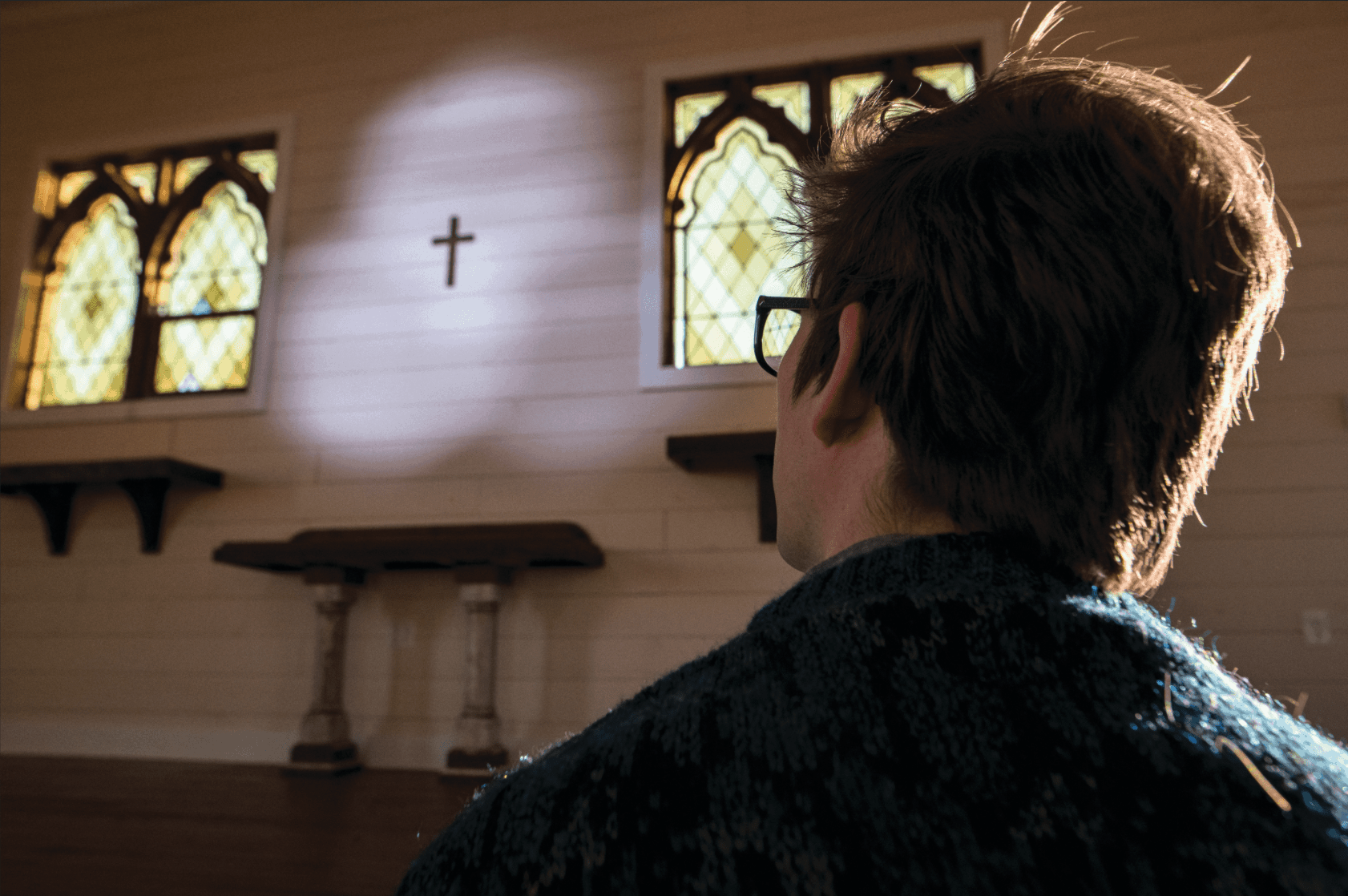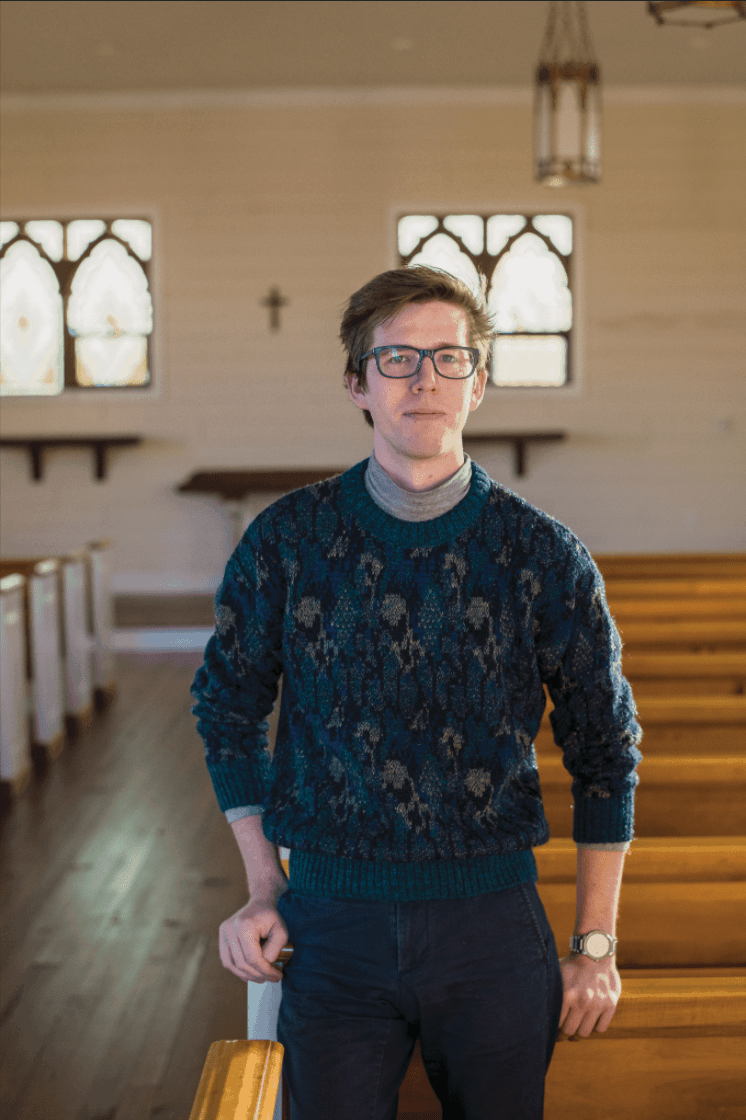
Sacred Spaces
Price Walden's Year of GraceBY JENNA MASON
PHOTOS BY PAUL GANDY
When the University of Mississippi hosted the Southern Division Conference of the College Band Directors National Association in February 2010, Director of Bands David Willson was looking for some new material for the program. He’d heard from John Emerson, band director at Booneville High School, that his former student Price Walden, now a member of the UM drum line and the wind ensemble, also composed original music. The Thursday before rehearsals, Wilson inquired whether Price had anything the band could read.
“So I lied,” says Price.
“I had some very preliminary sketches and ideas,” he admits, but nothing ready to be played. “This was before I was diagnosed as bipolar, but I definitely went into a manic state.” By the following Tuesday, the band had read and liked the hastily composed piece, and they decided to play it at the conference.
In the subsequent eight years, at least fifteen college bands have bought the piece, titled Hydrogen Jukebox, to play themselves.
For those who know Price, this phenomenon was not out of the ordinary. In fact, when he was sixteen, Price had shown an original composition to his high school band director, who then showed it to Bob Taylor, the band director at Northeast Community College in Booneville, Mississippi. Taylor, too, was impressed and elected for the college’s band to play the piece.
Price’s mother played what she called “church piano” in his youth, and his grandfather exposed him to a great deal of music before he passed away when Price was twelve. Once his parents saw his early talent and intense interest in piano, Price explains, “They were very supportive—but they also didn’t know what to do with me.” He began piano lessons, which he describes as learning a new language, but even at age twelve that language made sense to him. In keeping with his modest nature, he qualifies, “We had the Internet. I could learn everything there.”

Fifteen years later, Price Walden has reached a new level of success. His latest work, Sacred Spaces, will premiere at Zankel Hall at Carnegie Hall April 9 at 7:30 p.m., performed by renowned Mississippi concert pianist Bruce Levingston. Levingston commissioned Price and New York–based composer David Little to create pieces inspired by Mississippi’s Bicentennial, and the full program debuted at the opening of the Mississippi Civil Rights Museum on December 8, 2017. The program, which explores questions of citizenship, freedom and national identity, also includes works by Lèos Janaček, Frédéric Chopin, Claude Debussy, Sergei Rachmaninoff and Franz Liszt.
When conceiving of the program, Bruce explains, “I wanted to find composers who had the ability to convey the sense of pain, sorrow, loss, rebirth and joy that is mingled together in these museums. Price Walden has the skills, artistry and inner character to be able to communicate those complex elements in his music.”
Price was flattered and challenged by Levingston’s invitation. “I asked myself,” he states, “‘What do I have to say that I have the right to say at the opening of the Civil Rights Museum, without putting myself at the center or falsely equating my struggles with those of the Civil Rights Movement?’”
In the concept of churches as places activists could gather, recharge and organize, Price found “a connection that felt true and not contrived, without pretending I knew about an experience that I didn’t.”

That connection stems from the significant role church has played in Price’s own life. “I write music because of how hymns affected me in church,” he explains. “It’s intoxicating.” Further, as a gay Christian in the South, Price has come to see his own church as a sanctuary. Sacred Spaces “celebrates the freedom to have a safe space, which is something people ridicule until they’ve needed a safe space.”
That sentiment is captured in the first movement, which starts simple, then gradually fills with more activity. “I was thinking about the experience of being in a church alone, maybe early in the morning, then the space slowly filling up with people and energy,” says Price. “It became about the salvation of the congregation—that feeling of finding a group of people who care about you.”
The second movement employs a very old musical form called chaconne, in which a repeating baseline provides the backbone as the music “stretches endlessly out on the keyboard.” “Canon in D” is a well-known example of the form. A metaphor for activists claiming space for themselves and their communities, Price explains, the pianist “slowly takes ownership of the space on the keyboard” while playing this movement.
The third movement takes the shape of a hymn, which Price has titled “This World Is My Home.” Price grew up in the evangelical church, whose intense focus on the afterlife is reflected in such hymns as “When We All Get to Heaven,” “On Jordan’s Stormy Banks,” “I’ll Fly Away” and “This World Is Not My Home.”
“I wanted to deliberately challenge that notion,” says Price, who remains deeply religious. He believes that the concept of a future heaven where all things will be made right has too often been leveraged against oppressed, marginalized or suffering groups in an effort to quell their dissatisfaction with the status quo. Instead, this movement acts as a call to action in the present.
Though Price wrote the three movements in sequence, he revised them in reverse. When Levingston read the third and final piece, he told Price, “This is the greatest thing you’ve ever written. Now revise the first two movements to support it.”
“Bruce has a very strong artistic personality,” Price concedes. “He had an idea of what he wanted a piece from me to be, and I knew the first two movements weren’t exactly that.” With the revisions, Price says, he was able to forge a more singular vision that better suits the original commission.
“Bruce has a certain taste level,” Price elaborates. “He’s not going to perform something that doesn’t hold up.”
Despite the elation of having his work performed at Carnegie Hall, Price is already hard at work on future projects. For one project, he is setting to music three poems by Molly McCully Brown, who graduated from the University of Mississippi with a Master’s of Fine Arts degree in 2016 and published her first book, The Virginia State Colony For Epileptics and Feebleminded, in 2017. The piece will debut in fall of 2018. “Obviously, I haven’t lived Molly’s life,” Price emphasizes, “but there are aspects of Christianity or disability that I can relate to.”
Price is also composing an opera set in 1940s Hollywood around the time the House Un-American Activities Committee was active. This piece explores the separation of public and private life and the dangers closeted gay actors felt at the time.
“Everyday I wake up and ask myself: Why should people want to listen to my music? I want to highlight something that’s not already being served,” Price explains. “My goal is always to speak to my experience but also amplify others’ experiences.”
When it comes to working within his own limits, Price acknowledges that having bipolar disorder poses serious obstacles. “It makes work tricky. Your brain is your most essential resource. My job is to come up with new ideas. My brain is what I work with, but also my brain is broken, so how do I fix my brain without shutting it down?”

More and more, Price explains, he’s learning to give himself space to flounder or even fail. In fact, he’s declared 2018 a personal “year of grace”—a year to be kind to himself when the ideas just aren’t there.
“It’s aspirational,” he laughs. “Sometimes I have to remind myself that most music is bad. If 90% of what I write today is bad, that’s okay.” Price recites this like a mantra he’s rehearsed many times over.
“Giving yourself permission to not be okay, to have bad ideas, to not have to explain yourself,” he goes on, “That’s grace to me.”









